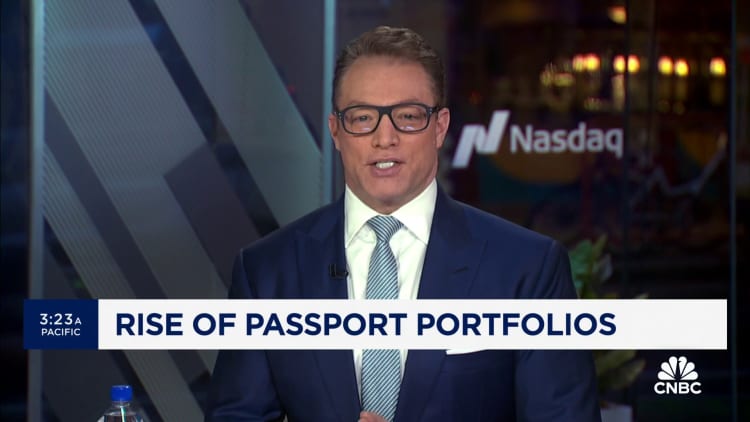
A version of this article first appeared in CNBC's Inside Wealth newsletter with Robert Frank, a weekly guide for high-net-worth investors and consumers. Register to receive future issues, directly to your inbox.
Wealthy American families are increasingly applying for second citizenships and national residencies as a way to cover their financial risks, according to a leading law firm.
The rich are building these “passport wallets” (collections of second, and even third or fourth) citizenships, in case they need to flee their home country. Henley & Partners, a law firm that specializes in high-net-worth citizenship, said Americans now outnumber any other nationality when it comes to securing alternative residencies or additional citizenships.
“The United States is still a great country, it's still an incredible passport,” said Dominic Volek, head of Henley & Partners' private client group. “But if I am rich, I would like to protect myself against levels of volatility and uncertainty. Rich people understand well the idea of diversification around what they invest. There is no point in having one country of citizenship and residence when I have the ability to diversify that aspect of my life too.
Recent high-profile examples of second citizenships include billionaire technology investor Peter Thiel, who added a citizenship in New Zealand, and former Google CEO Eric Schmidt, who applied for citizenship in Cyprus.
Thomas Kokta | Rf Photographer's Choice | fake images
Of course, the rich are not packing up en masse and abandoning their American citizenship. While a relatively small number of Americans renounce their citizenship each year to declare a new country of origin, primarily due to tax filing requirements, the so-called “exit tax” required to renounce citizenship makes it financially prohibitive for most, except for the ultra-liberals. rich simply renounce and declare a new citizenship.
Instead, many wealthy Americans are seeking an additional visa or citizenship program to complement their U.S. passport.
According to Henley, the top destinations for supplemental passports among Americans are Portugal, Malta, Greece and Italy. Portugal's “Golden Visa” program is especially popular because it offers a path to residency and citizenship (with visa-free travel across Europe) in exchange for an investment of 500,000 euros (approximately $541,000) in a private equity or fund. Malta offers a Golden Visa for €300,000 invested in real estate, which Volek says has become “especially popular among Americans.”
“With Malta you become a European citizen, with full settlement rights throughout Europe,” he said. “So you can live in Germany, your children can go to study in France and you have the right to live, work and study throughout Europe.”
There are three main reasons for the rise of US passport portfolios or “domicile diversification.” An alternative passport makes travel easier for Americans venturing to parts of the world that are less friendly to the US.
“For American, British and Israeli citizens who suddenly feel unsure of their welcome abroad, supplementary passports provide vital flexibility,” according to a Henley report. “With increasing global instability, holding citizenship in another country, particularly one that is considered more neutral or politically benign, now provides a valuable backup or alternative option.”
Another reason is business travel, which in many countries can be safer and less conspicuous with a non-US passport. American business leaders could be targets of “resentment, hostage-taking, or random terrorism in the chaos of collapsed states or high-risk countries to which they need to travel for business purposes,” according to the report, which says stakeholders They range from coverage – fund managers meeting with global clients to mining company executives visiting trading sites.
Using a secondary passport can also help with cross-border financial transfers or transactions within the new country.
Finally, some wealthy Americans simply want a backup residence for possible retirement, to be closer to their families living abroad, or for lifestyle reasons in the new era of remote work. For others, American politics is the driving force.
“We all live in uncertain times, not just in the United States, but in every nation in the world,” Volek said. “Who knows what's going to happen next. It's really about having not only a Plan B but also a Plan C and D.”
Globally, millionaire migration is expected to reach a new high in 2024, as wars, government crackdowns on wealth and political uncertainty drive more wealthy residents to other countries. An estimated 128,000 millionaires will move to a new country this year, up from 120,000 in 2023 and 51,000 in 2013, according to Henley.
The United States remains one of the top destinations for global millionaires leaving other countries, with a net entry of 2,200 millionaires in 2023 and a projected entry of 3,500 in 2024, according to Henley.
China continues to be the largest source of millionaire emigration, losing 13,500 net millionaires last year.
“The wealth creation opportunities in the United States are second to none globally,” Volek said.
Sign up to receive future editions of CNBC Inner wealth newsletter with Robert Frank.









